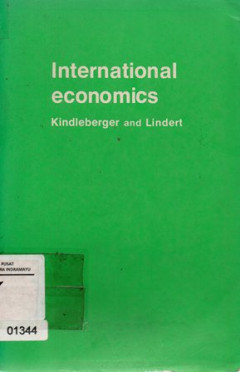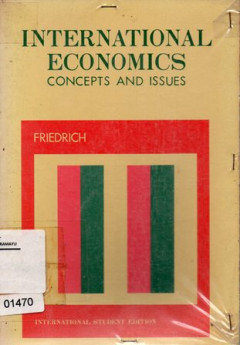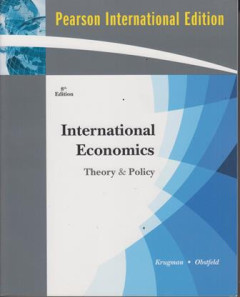Ditapis dengan

International Economics
Major changes in the international economy call for changes in the study of international economics. Such developments as the OPEC victory over the oil-importing countries, other fresh attempts at forming international cartels, the increased flexibility of exchange rates since 1971.
- Edisi
- -
- ISBN/ISSN
- 0-256-02028-0
- Deskripsi Fisik
- xiii, 562 hlm,; 22 cm.
- Judul Seri
- -
- No. Panggil
- 337 KIN i1

International Economics
This book attempts to introduce students with a relatively minimal economics background to the field of international economics. Its premise is that a few basic theoretical concepts can go a long way toward helping to interpret international economic relations.
- Edisi
- -
- ISBN/ISSN
- 0-07-022435-8
- Deskripsi Fisik
- 322 hlm.; 21 cm
- Judul Seri
- -
- No. Panggil
- 338.91 FRI i1

International Economics : Theory & Policy
The idea of writing this book came out of our exprerience in teaching international economics to undergraduates and business students since the late 1970s. We perceived two main challenges in teaching. The First was to communicate to students the exiting intelectual advances in this dynamic field. The second was to show how rhe development of international economics theory has traditionally bee…
- Edisi
- 8th Edition
- ISBN/ISSN
- 978-0-321-55398-0
- Deskripsi Fisik
- xxvii, 706 hlm.; 26 cm.
- Judul Seri
- -
- No. Panggil
- 337 KRU i1
 Karya Umum
Karya Umum  Filsafat
Filsafat  Agama
Agama  Ilmu-ilmu Sosial
Ilmu-ilmu Sosial  Bahasa
Bahasa  Ilmu-ilmu Murni
Ilmu-ilmu Murni  Ilmu-ilmu Terapan
Ilmu-ilmu Terapan  Kesenian, Hiburan, dan Olahraga
Kesenian, Hiburan, dan Olahraga  Kesusastraan
Kesusastraan  Geografi dan Sejarah
Geografi dan Sejarah